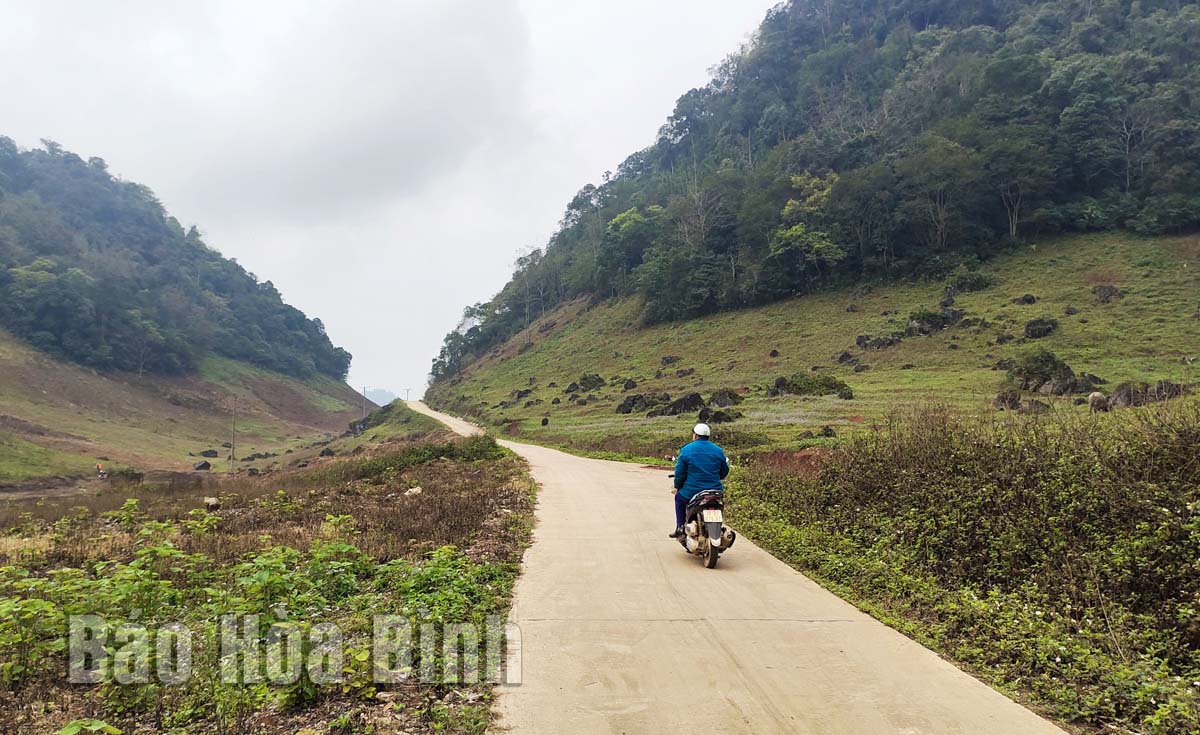
(HBO) - In recent years, Da Bac district of Hoa Binh province has focused on developing transport infrastructure in rural areas, considering it an important solution to speed up the hunger eradication and poverty alleviation process and the new-style rural area building in the locality.
A rural road in Trung Tam hamlet, Trung Thanh commune. Da Bac district has invested in developing rural transport infrastructure in recent years.
The transportation infrastructure development in the district faces many difficulties because Da Bac is an upland district with hilly and mountainous terrains. In addition, the district is considered a hot spot for natural disasters, especially landslides during the rainy season which damage the local transportation system.
At present, Da Bac has a total of 1,317 km of roads, including 163.5 km of district roads, 128.7 km of communal roads, 453.62 km of hamlet and village roads, over 305 km of alleys, nearly 232 km of roads in production areas and field roads, and over 34 km of urban roads. However, there are still more than 254 km of roads with uneven surface.
The district has also 34 bridges and 32 spillways, with a total length of 627.5m, and 799m, respectively.
According to Dao Tien Quyet, Head of the economic – infrastructure division of Da Bac district, the technical conditions, structure, scale and ability of roads, bridges and spillways in the district basically meet the travel and goods transport demand of local residents.
However, due to the influence of rains and floods, some roads, bridges and tunnels in the locality have been damaged and degraded. The construction of a number of transport projects remains slow, significantly affecting the travel of people and vehicles.
To address these difficulties, the local authority has mobilised over 1 trillion VND (over 42.64 million USD) to invest in developing transport infrastructure. Since 2021, the district has focused on implementing a project to concrete rural transport roads in the 2021-2025 period.
Accordingly, the total budget for the project is over 2.25 trillion VND. As scheduled, 5 km of 12 transportation roads in the district are concreted.
So far, 4.2 km of rural roads in Dong Chum, Dong Ruong, Tan Minh, Giap Dat, Tien Phong, and Yen Hoa communes have been completed.
The district's authority has also accelerated the implementation of new-style rural area building movement. A total of nearly 408 billion VND was allocated to the locality to implement the criteria No. 2 on rural transport infrastructure development.
Accordingly, inter-village roads and over 40 km of hamlet roads in Tan Minh commune have been concreted. The district has also concentrated on preventing and overcoming consequences of natural disasters along roads, especially at weak bridges and spillways./.
The Standing Board of the Hoa Binh provincial Party Committee met on March 18 to review and guide major investment projects aimed at boosting local socio-economic development.
The air is thick with the hum of drills and the clatter of machinery as the Hoa Binh – Moc Chau expressway takes shape amid the rugged terrain. Welding sparks illuminate the faces of workers, and concrete mixers churn relentlessly, laying fresh pavement on the newly-carved road. The construction site buzzes with a palpable sense of urgency, particularly in Hoa Binh province where the expressway's future is being forged.
The northern province of Hoa Binh, with over 467,000 hectares of natural forest and more than 100,000 hectares of production forest, holds significant potential for carbon credit market development.
Replacing substandard houses with more sturdy ones by June 30 is the direction given by Nguyen Phi Long, alternate member of the Party Central Committee and Secretary of the Hoa Binh provincial Party Committee, at a meeting held in early March by the provincial Steering Committee for the programme to eliminate temporary and dilapidated houses for the needy.
Recognising digital transformation as an inevitable trend, authorities and agencies in Hoa Binh have made great efforts in the work by focusing on three core pillars - digital government, digital society, and digital economy, resulting in enhanced competitiveness, improved investment climate, and ensured economic and social welfare.
In recent years, Da Bac district has improved administrative reform with a one-stop shop mechanism, streamlined inter-agency procedures, and a shift to digital platforms. These efforts have enhanced public service efficiency and contributed to local socio-economic development.



